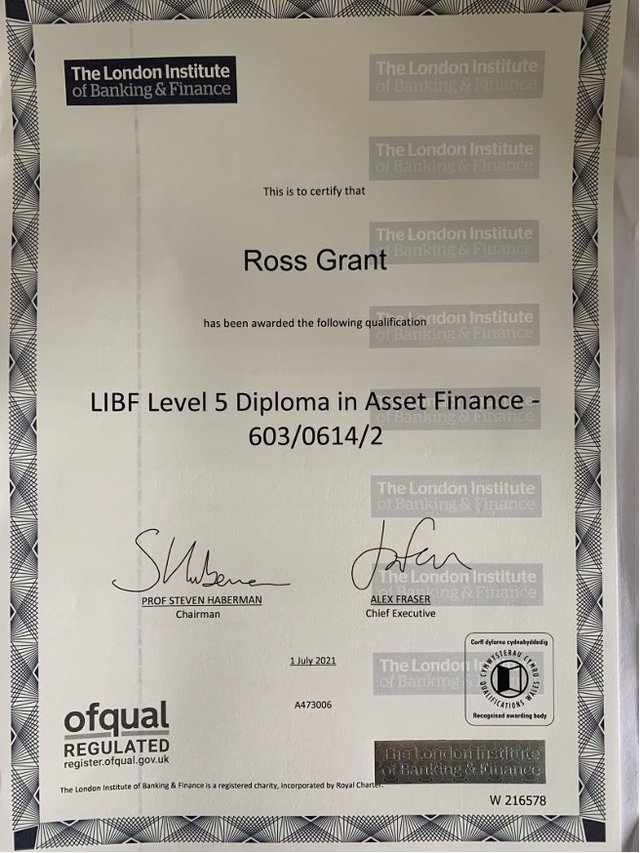EDUCATION
Going professional
For asset finance professionals wanting to develop their knowledge of the industry, gaining a recognised qualification designed specifically for the sector might help give you the edge. Katherine Muir talks to Ross Grant who recently completed a Diploma of Asset Finance about his experience.

R
oss Grant works as a senior finance consultant at White Oak, which provides financing to SMEs. He recently completed the Level 5 Diploma in Asset Finance (DipAF) through the London Institute of Banking and Finance (LIBF).
Grant has worked for White Oak for just over two-and-a-half years. He decided he wanted to study for the DipAF to get a broader understanding of the industry after talking to colleagues and a director at White Oak and so after approaching the company they agreed to sponsor his studies.
Ross Grant of White Oak
The course currently costs £3,300, with a £350 discount for FLA members. It is an online course and takes around 15 months to complete.
It is pitched at both those new to the industry as well as more experienced professionals, aiming to give an understanding of asset leasing, regulation, risks, return and credit, and is divided into three units covering business management and the provision of asset finance; the legal and regulatory requirements; and, the sales and account management processes.
Ross says after discussing it with his manager he decided to take it on although he knew that it would be a commitment on top of his job and was advised to think carefully about whether it was something he wanted to do and still be able to keep up with his work. He says he usually finished work and would do “three, maybe four hours a night of study, so around 15 or 18 hours a week”.
He says the course was “very well rounded” and he feels “100 per cent” positive about his experience doing the diploma, which he believes is worthwhile if you’re starting off in asset finance, as it helps give you a good foundation but also is useful those who have worked in the industry for a while and looking to get “that professional development and give them another string to their bow.”
He says: “I’m in more a customer-facing role so I work primarily in effect as a broker — but there were other people on the course that had been on the more operational side, so they had lots of experience in one area but absolutely zero in others. From my role, I kind of had a vague understanding of a lot of it but it gave me more detail.”
“It reaffirmed a lot of fundamentals of asset finance that I already I knew. It went into a lot more detail so if you knew the outer element of it you got to know the history of it a bit more and how things have changed. There were lots of parts that were legal and regulatory that I didn’t really know about so there was a lot of information there that was really useful.”
As to how current the course content was, and how he felt it took into account recent events such as the effects of the pandemic on the industry, he says: “As part of it you had to do coursework and case studies and in a lot of the case study questions that came up, you were able to incorporate Covid and Brexit and things like that into your answers.
“So, a lot of the content was usable experiences from the financial crash in 2007, so there were a few parallels in that because a lot of the structures that were put in place by the Monetary Policy Committee and all the financial regulators, that was all now relevant again.
"It did cover the fundamentals, but it helped give those specifics to the finance industry and asset finance as to Covid and Brexit. I’d say the case studies were probably the best way of doing that because you were able to do your own research as to how does this actually impact [the industry], and how is that what I’ve just learned relevant to what’s happening right now? You were given an example case study of a company that was looking to change their operation systems to protect themselves from the things that have happened, so while I wouldn’t say it was a bit of a blessing that Covid had happened, it was just very relevant.”
And his tips for anyone thinking about doing the diploma: “My advice would be to try and speak to someone within their organisation that has already done it to see what their experience was and what it’s done for them, but I couldn’t recommend the course any more highly from my experience because I feel it’s set me up for eventually taking that next step, and now I’m at a junction where I’ve got lots of different paths that I can take.”
Why I signed up for the Diploma in Asset Finance
I joined White Oak in December 2018 after starting my career with a major UK bank in 2015. During my time with the company, I have worked to build my own client base from the ground up through building relationships, getting to understand potential clients’ businesses better and being able to provide a wide variety of financial solutions to their short and long-term goals/obstacles.
Since joining I’ve gained experience with hire purchase and leasing as I spoke with businesses looking to buy new assets or refinance existing ones. I had to understand and learn the basics of asset finance quickly.
It was from here that I decided to further my own understanding and decided to commit to the Diploma in Asset Finance. I felt it would help to give a deeper knowledge and understanding as the course covered how asset finance works, the legal and regulatory requirements in the industry and the account management process and lifecycle of an asset finance agreement.
Now I’ve completed the diploma, I’m unsure as to what the next steps may be, as it is the foundation to many different career paths if I want it to be. My first focus is to put what I’ve learned to use for new and existing clients, as the market in my view is currently experiencing a boom.

With the demand for vehicles both new and used well outweighing supply, businesses are looking to try and upgrade vehicles and equipment but are perhaps being faced with much higher prices. Where they may have once paid cash before, they are now more open to using finance to cover these purchases and keep a hold of their own cash.
I think this is a great time to be working in asset finance as the opportunities for lenders, brokers and businesses to build relationships is more imperative than ever, given the difficulties everyone has faced over the past 18 months.
Ross Grant works as a senior finance consultant at White Oak. He recently completed the level 5 Diploma in Asset Finance through the London Institute of Banking and Finance (LIBF).